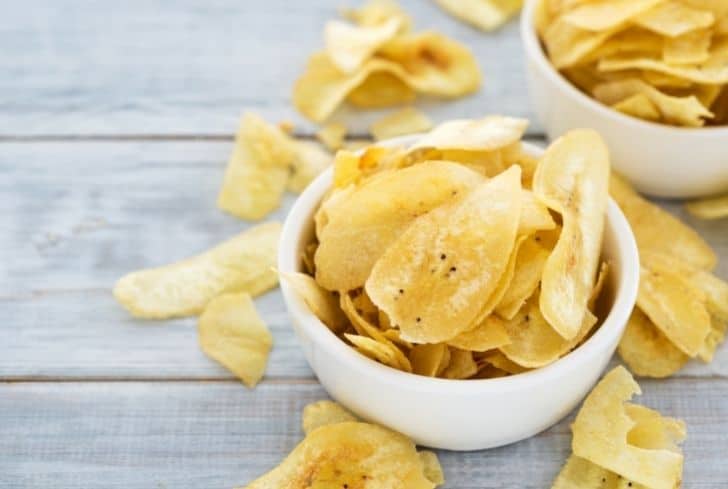If you log on to Wikipedia and search the word ‘chip’ or ‘chips’, you will get close to 50 results, each detailing what the word could mean in a different setting. It could be in food, sport and gaming, computing, finance and more.
For this article, we will be looking at those chips that have an environmental effect that could be of value-addition to the environment. They include wood chips, pringle chips, tortilla chips, pine chips and traditional potato chips. We will be looking at composting these different types of chips.
Are Chips Compostable?
Yes, chips are completely compostable. Almost everything out there that is organic can be composted, including leftover chips. The rule of thumb is that anything organic, or occurs in or comes from nature and is not man-made, is compostable. Chips come from potatoes, an organic plant, making them completely compostable.
Just like your potato peelings and other scraps from cooking with tubers, potato chips, or other types of chips, will function as a “green” material that provides the compost with nitrogen.
Seeing that chips are cooked food, they will release odors when decomposing, odors that will be irritating to humans, but very inviting to pests. As such, compost chips in an enclosed bin or bury them at the center of the composting pile. If you leave them resting on the surface, the pests will have their way with them.
The greasy chips are a bit harder to compost. Grease, alongside other foods like meat, dairy products and fish, should never be added to the composting process when in its purest form.
If you have to add greasy chips, add them in moderation and do not add too many to the compost, lest you experience the same problems as if you would add pure grease there. This is because the grease will smell really bad when decomposition is in progress, attracting pests.
Also, if added in large quantities, it might make the entire process go anaerobic, which is the opposite of what a normal composting process should be.
Furthermore, when adding chips to your pile, be sure to crush them a bit so that they decompose more quickly and will finish breaking down at the same rate as the other ingredients you are using.
Can You Put Stale Chips in Compost?
Of course, you can compost stale chips. The idea behind composting is that waste decomposes in a controlled place, and achieves a healthy compost that will then be used to enrich the soil and provide minerals to your crops and plants.
Chips that are stale, expired or bad have already started the process of achieving decomposition, making them ideal to compost. Since they are organic foods, that appear in nature as potatoes, they will be ideal for composting. They will introduce nitrogen to the composting process and be of vital help.
Again, like with fresh chips, they will invite pests when decomposing. You therefore either have to bury them with the other composting materials or ensure you close the compositing bin.
Regardless, do not leave them resting on the surface of the composting materials without turning them so that they decompose. Again, be sure to crush the chips so that they decompose quickly, and also so that they break down at the same rate as the other materials inside the composting bin.
Can You Compost Wood Chips?
Of course, you can compost wood chips. This is a sharp turn away from the edible types of chips but nonetheless, wood chips are compostable. Wood chips can be added to a compost pile to provide a better carbon: nitrogen ratio.
With their rigid structure, wood chips also enhance the flow of air through the compost since they are less prone to compact. Again, the rule of thumb is that (almost) everything organic, can be composted.
Wood chips come from…you guessed it, woods, which are basically trees. This is why when the trees break in the forest or drop leaves, they start to decompose. Wood chips will therefore break down and offer a lot of nutrients and amendments to the soil.
Some argue that wood chips are a green material but it is fair to conclude that they are browns, full of carbon. They cannot decompose on their own, so they require the addition of green or nitrogen-rich materials such as kitchen waste, fresh leaves or fresh grass clippings.
When wood chips are used to amend the soil, the process takes a few years, but the end result is always achieved. When added as compost, the process is hastened and you will see improvements in a short while.
Be sure to note that wood chips will lower the soil’s pH, making it more acidic. This is good news for acid-loving plants like evergreen trees and shrubs, as well as areas where the soils are neutral or a bit alkaline.
However, it is unfortunate for other plant species that require neutral or alkaline soils. Therefore only use composted wood chips in areas where the soil’s pH is manageable, lest you end up with excessively acidic soils.
Also, depending on the type of trees, wood chips may release tannins that may be toxic to some of the soil organisms, so tread lightly and do some research before composting and later using compost that has decomposed wood chips.
Can You Compost Pine Chips?
Certainly. You can also compost pine chips. Not only are pine wood chips compostable, but so are shredded pine and pine needles. They all are organic matter and when composted, can enhance plant performance and health directly.
Using pine chips for mulch improves water retention, reduces evaporation and improves the moisture levels of the soil. Also, when applied properly, pine chips will reduce soil compaction, erosion, weeds and salt build-up in soils.
In the composting bin, pine chips are brown materials and for effective decomposition, you should add fresh grass clippings and other green matter to the process.
Although they do not decompose as quickly as everything else inside the composting bin, the chips are small enough and might not be entirely recognizable in the compost when they are not fully decomposed.
Like with other wood chips, there is the likelihood of changing the pH of your soil to slightly acidic, depending on the type of tree used. It is for this reason that most people avoid using pins in compost for they believe it will alter their soil’s pH to a bit more acidic.
Surely, enough pine needles or chips have a pH of between 3.2 and 3.8 when they fall from the tree. However, after composting, the pH is nearly neutral, completely eliminating the fear of lowering your soil’s pH levels.
You can safely add pine needles and chips to compost without fear that the finished product will harm your plants or acidify the soil. However, working pine chips into the soil without composting them first, may temporarily lower the pH levels.
Also, if you work them without composting them first can be a challenge since the chip has a coating that may make it difficult for bacteria and fungi to break them down. Composting them clears all such fears.
Do Tortilla Chips Go Bad?
Yeah, tortilla chips can go bad. Like all foods, tortilla chips certainly can go bad and depending on the product making them, they will have a varying shelf life. Processed and packaged tortilla chips come in a bag which definitely has a sell-by or best before date.
The date does not necessarily mean that the chips will go bad effectively on that date and that they cannot be consumed; it is just a guide. The rate at which tortilla chips go bad also depends on whether the containing bag was opened and if it was sealed well after.
If you open them, ensure they are in an airtight bag and do not expose the opened bag to temperature fluctuations that could create condensation or any highly humid area. Also, if you freeze or refrigerate them, their life is extended by weeks and even months.
Even if tortilla chips go bad, it does not mean that if you consume them you will get sick. In fact, even if they are bad by a month, you will not get sick. Luckily, you can always revive them by placing them in an oven with oil and re-crisp them again.
If you store the chips in a sealed container, you will also extend their life by keeping the moisture out. If you are really skeptical about reviving and consuming bad chips, you can just go ahead and compost them. You only need to crush them into tiny pieces and then add them to your composting bin.
You should also bury them in the middle of the pile and then ensure you close the lid on the bin as pests will most likely come to investigate the composting process and probably have their way with the tortilla chips.
Can Pringles Go Bad?
Yes, Pringles can go bad. However, the duration before they go bad can be long and one can even extend such duration by some time. Remember, it is not entirely unheard of that one eats pringles whose expiry date has come and gone.
The date simply signifies that the pringles might not be as flavourful as they once were. This is why some will probably eat canned chips whose expiry date has passed by even up to three weeks. They might be less flavourful and crunchy as they were before expiry, but you can still make do with them as they are.
All you need is an oven and some heat. Remember, Pringles are a brand of packaged potato chips, that can go bad with time. According to Eat By Date, packaged potato chips like Pringles can last up to or be consumed 3 weeks past their expiry date. If opened, you can consume them for up to 7 days past their expiry date.
Apart from the expiry date, Pringles chips as well as other types of potato chips can go bad easily in a variety of ways. If you store them improperly, they will go bad really fast, even if the expiry date is ages away.
If placed in a humid place, without being wrapped well, the chips will lose their crunchy state and go bad really fast. You can tell that the chips have gone bad if they have lost their crispy crunch which is the most enjoyable attribute of such foods, given their little nutritional value.
If they have gone bad, consider not consuming them as they might bring about health risks like stomach aches and food poisoning. If they have gone bad, consider composting the Pringles chips, a way that will see them used for a positive purpose rather than throwing them away. If you feel that you would like to extend the shelf life of the potato chips, store them in a cool, dry and dark place.






